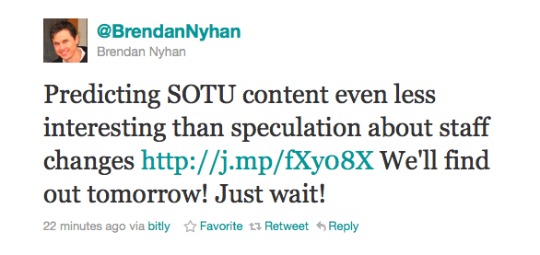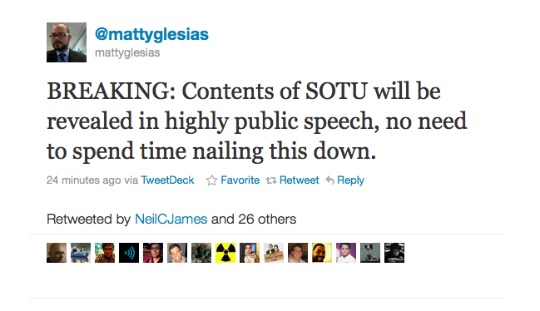Could not help but notice two Tweets today that seem to sum up my own view of State of the Union preview reports and coverage.
The first came from University of Michigan political scientist Brendan Nyhan.

And the second came from Matt Yglesias.

Nyhan links directly to the story that might have “won the morning” had it not been for the terrorist attack at Moscow’s Domodedovo airport. It’s Politico’s big trailer for the president’s big speech, written by Carol E. Lee and Glenn Thrush, and it is thoughtful, direct, self-assured, and awfully unnecessary and dull.
In his speech, the president will talk about jobs, the deficit and the future of the nation’s troubled economy, but most of the attention is going to be on the theatrics in the room. It will be a night defined by the shooting of Rep. Gabrielle Giffords (D-Ariz.) and murder of six bystanders in Tucson less than a month ago and the highly public soul-searching that has played out since then on the need for greater civility in political debate.
Obama will honor Giffords and other victims of the shootings, their families and the heroic first responders. His aides believe he’ll reach a broader audience with an emotional and patriotic appeal — one without the faintest whiff of partisan politics.
On one level, these kinds of reports are pure nuisance. If they’re accurate (and the above isn’t exactly a Spoiler Alert!), then they merely ruin the few surprises that make these kinds of nights barely watchable—like a too-revealing movie trailer.
If they’re inaccurate, well, what’s the point?
Far too often these kinds of pieces are plugged up with bloat about what a speech may or may not mean; how it will or will not be received; who will and will not stand. It all seems indicative of a news cycle that simply cannot wait for news to happen.
Does anyone in the public, or even in Politico’s core beltway savvy readership, genuinely care that former Bill Clinton aid William Galston says this, for instance?
“The president has a very delicate balancing act, and … this State of the Union may turn out to be the most important speech of his presidency—not because it’s do or die but because he has to build on the momentum he’s got now,” Galston said. “This is all about regaining his balance and the initiative.”
You can save that line for a good several SOTU preview pieces to come.
Nevertheless, the Politico piece does have something for speech and rhetoric nerds out there.
In a video preview of his speech, Obama sounded some Clintonesque tones when he urged the nation to “come together as a people” and to “focus on what binds us together as a people.” Clinton was heavy on “together” in his 1995 address and mentioned “people” nearly 75 times as he stressed how the good of the people is the goal of government action and the reason Republicans and Democrats need to work together.
The health care law, which House Republicans recently voted to repeal, will get a hefty shout-out. In doing so, Obama will put heavier emphasis on anecdotes of Americans who would lose protection if the GOP succeeded in rolling back the law and offer less of the technical jargon that has weighed down many of his speeches on the topic in the past.
Meanwhile, Michael D. Shear at the Times’s The Caucus blog has a SOTU piece that at least offers something concrete: the behind-the-scenes of how the speech came together. And a look at how Obama’s approach differs from Clinton’s.
Aides said the process began with an extended “download” from the president as he sat in the Oval Office surrounded by his top speechwriter, Jon Favreau; David Axelrod, his senior adviser; and other top White House officials.
Mr. Obama discussed what he wanted to say while Mr. Favreau typed furiously into his laptop computer, capturing not only the president’s broad policy goals but Mr. Obama’s phrasing and tone.
… Mr. Clinton would begin practicing the speech more formally, usually in the White House Family Theater, often with a teleprompter. But even during those sessions, Mr. Waldman said the president tended to go off script, offering new phrases that would be incorporated into the speech.Mr. Obama tends to be more disciplined in the practice sessions, aides said, and tends to adhere more to the written draft.
Not exactly riveting stuff. But I’ll take the “making of” over the “trailer” today.
Joel Meares is a former CJR assistant editor.
